
Catacol is a small village on the Isle of Arran, Scotland.
The Arran whitebeams are species of whitebeam endemic to the island of Arran, Ayrshire, Scotland.

Sorbus anglica, the English whitebeam, is a species of whitebeam tree in the family Rosaceae. It is uncommonly found in Ireland and the United Kingdom, with an entire British population estimated at about 600 individuals.

Sorbus arranensis, sometimes referred to as the Scottish or Arran whitebeam is a species of plant in the family Rosaceae. It is endemic to the island of Arran in Scotland.

Karpatiosorbus badensis is a species of plant in the family Rosaceae. It is endemic to Germany.

Karpatiosorbus bristoliensis is a species of flowering plant in the family Rosaceae. It is known commonly as the Bristol whitebeam. It is endemic to Great Britain, growing wild only in the Avon Gorge and in the Leigh Woods area of Bristol. There are around 300 individuals as of 2016, and the population is thought to be increasing.

Sorbus eminens, the round-leaved whitebeam, sometimes classified as Aria eminens when the Aria subgenus of Sorbus is elevated to full genus, is a species of plant in the family Rosaceae. It is endemic to Great Britain. It is threatened by habitat loss.
Sorbus lancastriensis, the Lancastrian whitebeam, is a species of deciduous tree or shrub in the family Rosaceae, growing to 6 m (20 ft). It is endemic to England, and is found within a 30 km (19 mi) radius from Morecambe Bay, in Lancashire. It is threatened by habitat loss. It has oval leaves. White blossom in spring is followed by orange to red berries in autumn.
Sorbus leptophylla, the thin-leaved whitebeam, is a species of plant in the family Rosaceae. It is endemic to Wales.
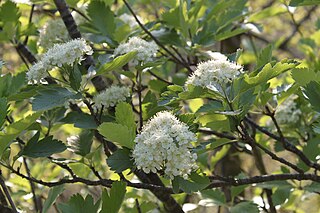
Sorbus leyana. Ley's whitebeam, is a species of small tree which is endemic to two sites in southern Wales. It is thought to have arisen by hybridisation of two species of Sorbus, one of which was the rowan. Its closest relatives are some of the other hybrid derived Sorbus species found in Britain.

Sorbus maderensis, a rowan, is a species of plant in the family Rosaceae. It is endemic to Madeira. It is threatened by habitat loss.
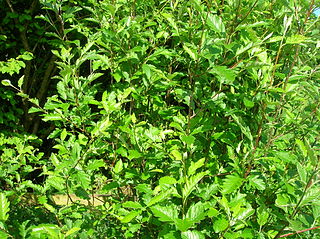
Sorbus pseudofennica is a species of plant in the family Rosaceae. Endemic to the Isle of Arran in Scotland, it is threatened by habitat loss. It is thought to be a naturally occurring hybrid between S. arranensis and S. aucuparia, probably with additional backcrossing with S. aucuparia. Sorbus arranensis is itself a hybrid between S. rupicola and S. aucuparia. Apomixis and hybridization are common in some groups of Sorbus species.
Karpatiosorbus subcuneata, the Somerset whitebeam, is a species of plant in the family Rosaceae. It is endemic to coastal north Devon and west Somerset in the United Kingdom. It is threatened by habitat loss.
Sorbus velebitica is a species of plant in the family Rosaceae. It is endemic to Croatia.
Sorbus vexans is a rare tree in the family Rosaceae. It is endemic to England. It is found along the coast between Culbone in Somerset and an area just west of Trentishoe in Devon. It can be seen in the Exmoor National Park. It is threatened by habitat loss.
Sorbus wilmottiana, the Willmott's whitebeam, is a species of whitebeam in the family Rosaceae. It is endemic to England, and is found in the Avon Gorge, in Somerset and Gloucestershire. It is threatened by habitat loss.
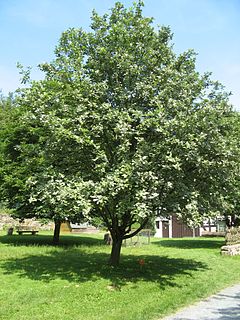
Sorbus aria, the whitebeam or common whitebeam, is a deciduous tree, the type species of the subgenus Sorbus subg. Aria of the genus Sorbus. It is native to most of Europe as well as North Africa and temperate Asia. Typically compact and domed, with few upswept branches and almost-white underside of the leaves, it generally favours dry limestone and chalk soils. The hermaphrodite cream-white flowers appear in May, are insect pollinated, and go on to produce scarlet berries, which are often eaten by birds.
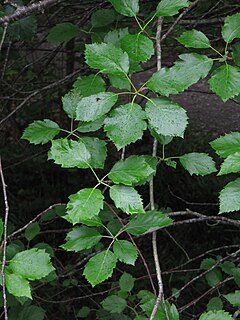
Karpatiosorbus admonitor, previously classified as Sorbus admonitor and also called the no parking whitebeam, is a species of whitebeam tree found in Devon, United Kingdom. Known only from the Watersmeet Valley at Lynton, with two stray plants growing on the coast above Sillery Sands, Countisbury.
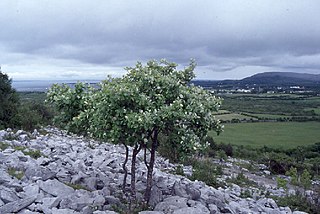
Sorbus hibernica, the Irish whitebeam, is a species of whitebeam endemic to Ireland. It occurs in most counties, usually as scattered individuals, or in small groups. It is sometimes treated as a species in the genus Aria, as Aria hibernica.
Sorbus porrigentiformis, the grey-leafed whitebeam, is a species of whitebeam endemic to England and Wales.













